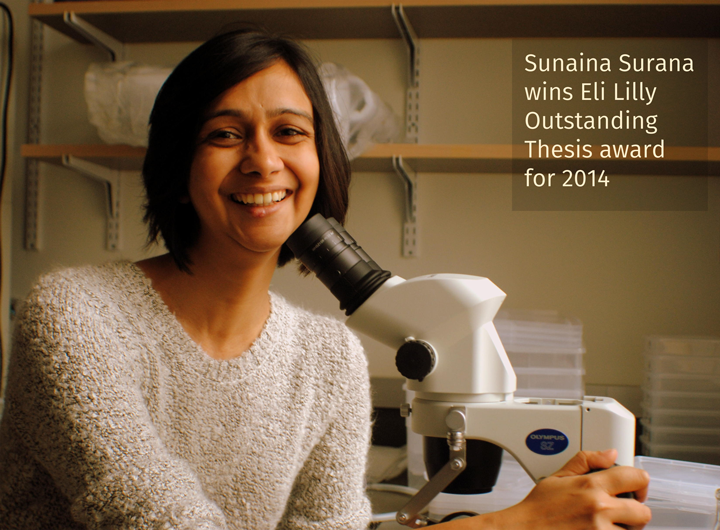Sunaina Surana, a former PhD student from the National Centre for Biological Sciences (NCBS), Bangalore, has won an Eli Lilly and Company Asia Outstanding Thesis Award for 2014. Sunaina's thesis titled "A framework to apply DNA nanodevices to a multicellular model organism" dealt with testing the operation of a DNA nanomachine which senses pH changes in a live organism - the roundworm Caenorhabditis elegans.
Sunaina worked on her research thesis at NCBS under the guidance of Prof. Yamuna Krishnan (now at the University of Chicago) and Dr. Sandhya P. Koushika (now at the Tata Institute of Fundamental Research, Mumbai). Dr. Krishnan's team develop and use new tools based on DNA for various purposes, one of which is to create sensors that can function within living cells. Sunaina's Eli Lilly award is the third from this group. Her predecessors, Souvik Modi and Dhiraj Bhatia, are also recipients of the award. "My work is actually a continuation of Souvik's efforts in developing a pH sensor that can be used in living systems. While Souvik studied the DNA-based pH sensor in cultured cells, my work took it a step beyond, by testing the sensor in a living organism, the nematode C. elegans", says Sunaina. The DNA-based pH sensor has been used to study chemical correlates of cellular transport by monitoring changes in acidity during the process of endocytosis (the process by which cells engulf materials from their environment).
"One of the goals of my work was to develop a platform to use DNA-based sensors that can target specific cell-types, and report on a variety of processes from within those cells in a multicellular living organism", says an enthusiastic Sunaina. The process started from within a test tube, where the ensemble of DNA and fluorophores (compounds that emit light of a certain frequency on excitation with light of a higher frequency) were assembled into a sensor. The sensor was then injected into the body cavity of the worm, where it was found to be specifically taken up by coelomocytes, the scavenger cells in C. elegans that are thought to perform functions akin to those of immune and liver cells of higher life forms. Once inside these cells, the pH sensor now allowed tracking of temporal and spatial changes in acidity through changes in fluorescence. A part of this investigation also established that the negative charge on the DNA backbone of the sensor was a key factor in its binding to a protein receptor on the coelomocyte surface. For testing and validating the functioning of this pH sensor, C. elegans was in many ways the perfect model: the nematode was easily cultured and genetically tractable and its transparent body made tracking the sensor outputs simple. Further, the research established a method to assess the stability of a variety of DNA nanostructures in the worm and demonstrated that this assay captures differences between stabilities of different DNA architectures. This paved the way for determining timescales up to which measurements using a sensor made of a DNA nanostructure could be made quantitatively.
"Sunaina has been the model grad student in every way. Conceptualizing an idea is easy - but much of the work lies in the ability to implement the idea. She worked across two labs, dealing with two principal investigators - teaching me genetics and Sandhya chemical biology. Sunaina faced at least three huge obstacles at completely different stages in her thesis work where most PhD students would have given up and changed their projects. She showed tremendous grit, tried a hundred different things, dug her claws in, and made a remarkable achievement for the field of DNA nanotechnology. I have been very lucky to have mentored a her along with a whole batch of extraordinarily driven and creative students at NCBS, whose passion for non-safe science has taken them places", says Dr. Yamuna, who was one of Sunaina's PhD advisors.
"I was always proud of the research work in my thesis, but this award is the icing on the cake! I am very happy that I got the Eli Lilly award", exclaims Sunaina. Her future plans? "I am going to be exploring cellular transport, and my next project will be on the neuronal transport of the tetanus toxin. I will not be using the DNA-sensor techniques I worked on right away - I would like to consider and look into other available technologies in this field. However, DNA sensors give one such a unique handle in addressing questions, that they are a definite possibility for the future", she says.
The Eli Lilly and Company Asia Outstanding Thesis Awards are prizes given to the top twenty PhD theses in India that have made significant contributions in the field of medicinal chemistry, organic synthesis, computational chemistry, structural biology or analytical chemistry. The award, consisting of a cash prize and a plaque, is instituted by Eli Lilly and Company (a global pharmaceutical company) and awarded by the National Organic Symposium Trust (NOST) Council at their annual conference J-NOST This year's award ceremony took place at NISER (National Institute for Science Education and Research), Bhubaneswar in December this year.










0 Comments